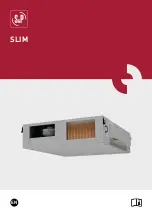
Quick Start Guide
1
Download the Owner’s Manual
Electrolyser
EL 4.0
Enapter makes different versions of
electrolyser based on your needs.
Electrolysers come in AC/DC
or DC/DC versions as well as air-
cooled or liquid-cooled versions.
Guide version 1.0
All information about Enapter devices can be
found at handbook.enapter.com.
Contact support at support@enapter.com.
For indoor
use only
For humid environments
additional IP68 protection
required
Check all parts for
damage regularly
Device out-of-the-box comes in Maintenance mode.
Yellow LED should be steady. Do not leave it turned on and
unattended for a long time.
Follow Installation Instructions in
the Owner’s Manual
2
Insert the two supplied jumpers into the Dry Con. port
in the 3rd and 4th positions on the front panel of the
EL. If you want/need to implement a safety chain,
please refer to Dry Contact Connection Guide in the
owner's manual.
Plug the power cable into the Power Port
and switch the power on.
AC – protective earth on the left, live on the right.
DC – positive on the top.
Dry Con.
2
1
3
4
G N L
You must follow owner's manual for all steps, including
pipe and wire connection, operation, transportation,
storage and disposal.
3
Water Inlet Requirements
H2O IN port is used for automatic refilling from connected
demineralised water source during normal operation, first refilling
and maintenance. During hydrogen production water consumption
rate is around 400 mL/hr.
Use Enapter Water Tank to solve the problem of
unstable water supply. It can be filled manually with
prepared demineralised water as well as directly
connected to water source.
Enapter Water tank deliveries pressure up to 2.75 bar.
Water conductivity must be < 20 µS/cm (at 25°C).
Сonnect electrolyser to water supply
only through water purification
system. Water conductivity must be
< 20 µS/cm (at 25°C) and pressure
between of 1-4 bar.
H2O IN
Proper inlet water source must be connected before
proceeding to the next steps.
Flush all water pipes with demineralised water before
connecting your device to ensure nothing is stuck in the lines.
4
Check H2 Vent and O2 Vent Lines
It is the installer's responsibility to regularly check and maintain
H2 VENT and O2 VENT lines, as well as keeping the lines free of ice
and any obstructions.
Do not insert any check valves
or obstructions into the
H2 VENT lines. This can cause
irreparable damage to your
hydrogen system.
H2 VENT
O2 VENT
No blockage should be present
on O2 VENT on the user side of
the interface.
DO NOT connect H2 VENT line with O2 VENT line.
Mixing these outputs is extremely dangerous.
Alternating current voltage of 220-240V is potentially lethal!
Direct current voltage of 48-60V can be a hazard!
A valid safety concept must be in place. Usually this involves
compliance with operating environment conditions, sufficient
ventilation and/or hydrogen detection systems at the
installation site. For more details, please consult the user
manual or contact Enapter.
Always check H2 vent and O2 vent lines for blockage and
damage.
External Enapter Water Tank
Optional




















